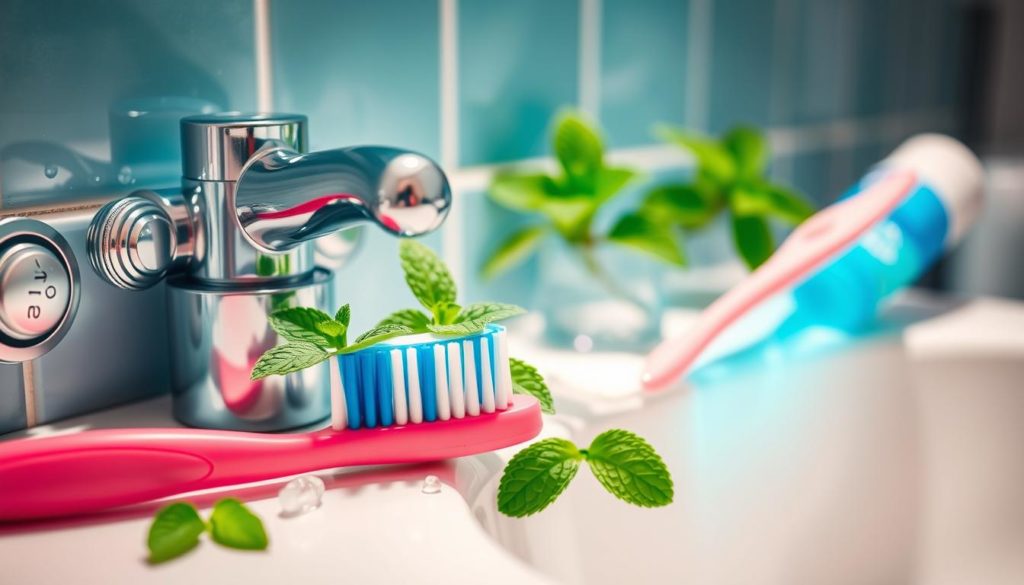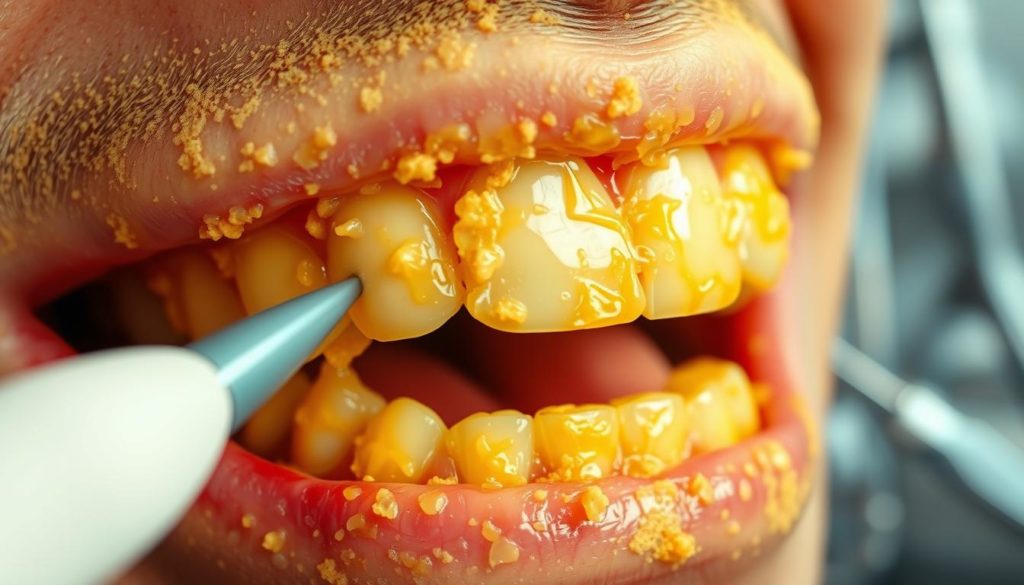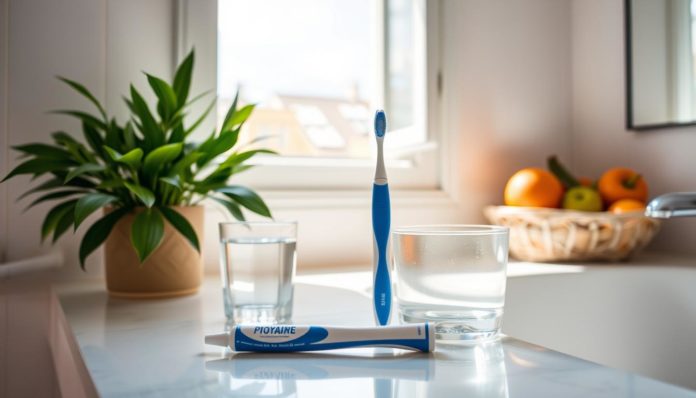Did you know that brushing your teeth well could cut your pneumonia risk by up to 40%? A study in JAMA Internal Medicine showed a strong link. It proved that good oral care can greatly lower the chance of getting pneumonia in hospitals, especially for ICU patients on breathing machines. These findings remind us how important toothbrushing is to prevent dangerous lung infections.
Good oral hygiene is key to stopping pneumonia before it starts. It’s a low-cost way to help people in the ICU get better faster. Keeping mouths clean takes a little effort but can have big health benefits. So, let’s dive into essential tips and tricks for daily care that boost lung health for all.
The Vital Link Between Oral Hygiene and Pneumonia Prevention
Maintaining proper oral hygiene is key, not just for a bright smile. It is crucial in pneumonia prevention. Pneumonia is a common hospital-acquired infection. It can lead to sepsis, threatening respiratory health.

Brushing twice a day and flossing are crucial. Oral microbes grow fast. So, a steady oral hygiene routine reduces hospital infection risks. This daily habit cuts down harmful bacteria that could enter the lungs.
The table below shows how dental care prevents respiratory infections. It points out complications from poor oral hygiene:
| Complication | Percentage in Hospitalized Patients |
|---|---|
| Pneumonia | 25% |
| Sepsis | 15% |
| Other Respiratory Infections | 10% |
Adding good dental care to daily routines is vital. It’s not just about oral hygiene. It’s about preventing pneumonia and safeguarding respiratory health.
How Bacteria in Your Mouth Can Lead to Lung Infections
Good oral hygiene isn’t just about keeping your smile bright. It also protects your lungs. If dental plaque builds up, it can be a breeding ground for dangerous germs. These germs could move to your lungs and harm your respiratory health.

Pathogens in Dental Plaque
Dental plaque is a sticky, colorless layer of bacteria on your teeth. This is where oral pathogens live and grow. If you don’t brush and floss regularly, these germs can cause gum diseases. But worse, they can be a threat to your lungs.
The Mechanism of Aspiration
Aspiration happens when things like saliva or food get into the lungs. This can bring oral pathogens into your respiratory system. There, they can trigger lung infections or even pneumonia.
Impact on Respiratory Health
Oral pathogens seriously affect your respiratory health. Bad oral hygiene has been linked to many lung infections in hospitals. To prevent these infections, we need to focus on oral care. Taking care of your mouth decreases the risk of getting a lung infection.
Effective Toothbrushing Techniques to Prevent Pneumonia
It’s important to brush your teeth the right way to keep your teeth healthy and avoid pneumonia. The right brushing technique, along with choosing a suitable toothbrush, plays a big role. Brushing often and long enough are key ways to boost oral health.
Correct Brushing Method
When brushing, hold your toothbrush at a 45-degree angle to your gums. Use soft, circular moves to clean every tooth well. Make sure you clean all parts of your mouth. Brushing your tongue helps get rid of germs and makes your breath fresher.
Choosing the Right Toothbrush
Picking a good toothbrush is very important for your teeth’s health. A soft-bristled, small-headed toothbrush works best. It gets into tight spots easily. Electric toothbrushes are a great option too. They clean your teeth well.
| Toothbrush Type | Features | Benefits |
|---|---|---|
| Manual | Soft bristles, small head | Affordable, easy to use |
| Electric | Rotating head, timer | Efficient cleaning, timed sessions |
Frequency and Duration of Brushing
Brushing your teeth twice a day for two minutes each is recommended to keep your mouth healthy and help prevent pneumonia. This routine helps get rid of plaque and bacteria. These can cause infections that hurt your lungs.
Importance of Brushing Twice Daily
Having a good oral hygiene routine is crucial for great dental care. Brushing your teeth twice daily is a key part of this process. It helps prevent gum disease and keeps your mouth healthy.
Brushing in the morning and at night stops harmful bacteria from growing. These bacteria can cause infections in your mouth. This habit keeps your breath fresh and reduces the chance of getting lung infections like pneumonia.
Adding twice daily brushing to your oral hygiene routine has clear benefits. It removes leftover food, fights plaque, and strengthens your teeth’s enamel. This toothbrushing also stops gum disease, keeping your whole body healthier, even your lungs.
| Benefits | Description |
|---|---|
| Prevention of Gum Disease | Regular brushing reduces plaque buildup, a primary contributor to gum disease. |
| Reduction of Respiratory Infections | Effective removal of harmful bacteria minimizes the risk of pneumonia. |
| Fresh Breath | Eliminates bad breath by cleaning away food particles and bacteria. |
| Enhanced Oral Health | Strengthens enamel and prevents cavities, contributing to overall dental care. |
The Role of Mouthwash and Flossing in Preventing Pneumonia
Using mouthwash and flossing is key for great oral health. This can help stop pneumonia. Adding these to your daily habit cuts down mouth bacteria and boosts dental cleanliness.
Benefits of Antimicrobial Rinses
Using antimicrobial rinses adds extra safety. They’re made to fight oral bacteria that can lead to lung issues. These rinses keep your mouth clean, lowering pneumonia risks.
Flossing for Comprehensive Dental Care
Flossing is important for full dental care. It cleans spots brushing misses, like between teeth. It removes food bits and plaque.
Doing it often keeps your gums healthy and cuts down bacteria. This can decrease infection risks. Daily flossing gives a deeper clean, important for stopping issues like pneumonia.
Toothbrushing and Pneumonia Prevention for Hospitalized Patients
Keeping up with oral care in hospitals helps fight against pneumonia. This is very true for patients using ventilators. Brushing teeth well and often is key.
A study in JAMA Internal Medicine showed that brushing teeth cuts down pneumonia risks. It also lowers the chance of dying in ICU and the rates of pneumonia linked to ventilators. Consistent mouth cleaning guidelines are vital, highlighting the importance for hospital staff to follow these practices daily.
We’re not sure about the effect of toothbrushing on pneumonia gotten without ventilators. Still, it’s best to keep up good hygiene by brushing teeth well.
Following strong oral care rules can improve how we prevent pneumonia. It helps with better patient health and less spending on healthcare. Having solid rules for mouth care and regular toothbrushing is crucial for keeping patients healthy and lessening pneumonia risks.
| Parameter | Impact of Toothbrushing |
|---|---|
| HAP Risk | Significantly Decreased |
| ICU Mortality | Reduced |
| Ventilator-associated Pneumonia Rates | Lowered |
| ICU Stay Duration | Shortened |
So, making sure everyone sticks to good toothbrushing habits is key. It protects patients from pneumonia and boosts overall hygiene.
Case Studies: Impact of Oral Care on Hospital-Acquired Pneumonia
Many case studies show how good oral care can lower hospital-acquired pneumonia. Looking at these can teach us the value of oral hygiene in hospitals.
Brigham and Women’s Hospital
Brigham and Women’s Hospital looked into how oral care affects pneumonia rates. They found out that careful oral hygiene greatly reduced pneumonia in their patients.
John Medical Center Study
John Medical Center’s research also highlights oral care’s role in reducing pneumonia. Their findings showed that patients in oral hygiene programs got pneumonia less often. This shows hospitals need good oral care plans.
Orlando Regional Medical Center
The Orlando Regional Medical Center made a big difference in lowering non-ventilator pneumonia. Their commitment to oral hygiene has made their clinical setting safer from pneumonia infections.
Developing an Oral Hygiene Routine for Better Respiratory Health
Having a good oral hygiene routine is key for your mouth and lungs. A well-planned routine helps you meet daily tooth care goals. It also improves your lung health over time. Here, we’ll look at what makes a good tooth care plan.
Setting Daily Goals
Setting daily goals for your teeth is the first step. Brushing, flossing, and rinsing every day is important. Doing this regularly stops harmful bacteria growth. This bacteria can cause bigger health problems.
Combining Brushing, Flossing, and Rinsing
Brushing twice a day, flossing once, and using an antimicrobial mouthwash can lower infection risks. Together, they get rid of plaque and bacteria. This keeps your mouth clean and your lungs healthy.
- Brushing: Use fluoride toothpaste and a soft-bristle toothbrush.
- Flossing: Reach between all teeth daily to remove plaque.
- Mouthwash: Opt for a rinse with antibacterial properties.
Adapting the Routine for Special Needs
It’s important to adjust dental care for those with special needs. Non-foaming toothpaste can help those who have trouble swallowing. Electric toothbrushes are great for those with limited movement. Making these changes ensures everyone can take care of their teeth and avoid lung problems.
Frequently Overlooked Aspects of Dental Care that Affect Pneumonia Risk
We often don’t see how daily dental care affects our overall health, especially with pneumonia risk. Consistent preventative dental care includes more than brushing and flossing. Regularly changing your toothbrush reduces bacteria and makes cleaning your mouth more effective.
How you store your toothbrush is also key in fighting bacteria. Keeping it in an open space lets it dry well. This reduces pneumonia risks. Adding antimicrobial mouthwashes in your routine can fight bacteria too. This strengthens dental hygiene education.
Talking about these often ignored practices is a big part of dental hygiene education. It helps lower the risk of respiratory infections. Reminding people often, through public health messages, about these simple habits can improve oral and overall health.
| Overlooked Dental Habit | Impact on Health | Recommendation |
|---|---|---|
| Not changing toothbrushes regularly | Increased bacterial growth | Replace every 3-4 months |
| Improper toothbrush storage | Promotes bacterial growth | Store in an open, dry environment |
| Skipping mouthwash | Increased plaque and bacteria | Use daily antimicrobial rinses |
Understanding and following these overlooked dental habits can lower pneumonia risk factors. It leads to better health overall.
The Relationship Between Gum Disease and Lung Health
Recent research shows a clear link between lung health and oral health. Studies point out that gum disease, known as periodontal disease, is linked to serious lung problems. This connection between teeth and lung health is very important, yet not widely known.
When gums are inflamed from periodontal disease, harmful bacteria flourish. These bacteria can move to the lungs, causing chronic lung diseases. For instance, bacteria in the mouth can infect the lungs or make existing lung conditions worse.
Beyond just the mouth, inflammation from gum disease can spread. It can even reach lung tissues through the bloodstream. This shows why good oral hygiene is vital for preventing lung diseases.
Bad diet, smoking, and not taking care of teeth can lead to gum and lung diseases. Improving one can help the other. This strong connection between dental and lung health highlights the need for overall health care.
| Aspect | Gum Disease | Lung Health |
|---|---|---|
| Inflammation | Present in gums | Can spread to lung tissues |
| Bacterial Load | High in cases of gum disease | Potential for infection upon aspiration |
| Risk Factors | Poor oral hygiene, smoking | Smoking, weakened immune system |
Conclusion: Integrating Oral Care into Health Regimes to Prevent Pneumonia
Adding oral care to your health plan is key for preventing pneumonia. Studies show that keeping your mouth clean is very important. Practices like brushing teeth, using floss, and antimicrobial mouthwash help keep your lungs healthy. It’s important to have a health plan that includes oral care. This helps protect your respiratory health.
The connection between clean teeth and pneumonia is very important, especially for people at higher risk. This includes those in hospitals and older people. Regular dental care can decrease lung infections. This results in better health overall.
Having a complete oral care routine is good for both your teeth and lungs. Making these practices part of daily life helps reduce pneumonia risk. This shows how vital oral care is for overall health. It truly highlights the importance of taking care of your mouth.
FAQ
How does toothbrushing help in preventing pneumonia?
Brushing your teeth is key in removing dental plaque, which contains harmful bacteria. This action reduces the bacteria in your mouth. So, you lower the chance of these bacteria getting into your lungs and causing pneumonia or other lung issues.
What are the recommended toothbrushing techniques to prevent pneumonia?
For effective brushing, use a soft-bristled toothbrush. Move it in gentle, circular motions to clean every tooth surface. Brush for two minutes, twice daily. Make sure to clean the back teeth and gum line where bacteria gather.
Can using mouthwash and flossing help in pneumonia prevention?
Yes, mouthwash can lower the bacteria in your mouth. Flossing removes plaque and food pieces that brushing misses. Together, they cut down the risk of bacteria reaching your lungs.
Why is oral hygiene particularly important for hospitalized patients?
Hospital stays, especially in the ICU or with mechanical ventilation, up the risk of getting pneumonia. Regular brushing lowers this risk. It reduces bacteria that can cause infections.
What is the link between gum disease and lung health?
Gum disease ups the chance of lung infections. The inflammation and bacteria from gum problems can get into the lungs. This can lead to serious health issues like pneumonia.
Are there any studies highlighting the impact of toothbrushing on pneumonia prevention?
Indeed, studies, including those in JAMA Internal Medicine, link good oral hygiene with fewer pneumonia cases in hospitals. They also show shorter ICU stays and fewer deaths.
How often should I change my toothbrush to help prevent pneumonia?
Change your toothbrush every three to four months to keep oral hygiene high and pneumonia risk low. Bristle condition and proper storage matter to avoid bacteria.
How does dental plaque contribute to lung infections?
Dental plaque has pathogens that can cause lung infections if inhaled. Good oral hygiene removes these germs, lowering infection risks.
What specific oral care protocols have proven effective in reducing hospital-acquired pneumonia (HAP)?
Strict oral care, like regular brushing, antiseptic rinses, and flossing, has cut HAP rates. Hospitals like Brigham and Women’s and Orlando Regional Medical Center report good results with these methods.
Why is it important to integrate oral care into daily health routines?
Regular oral care keeps your teeth and lungs healthy. Making it a habit can greatly reduce your pneumonia risk. This improves your overall health.


